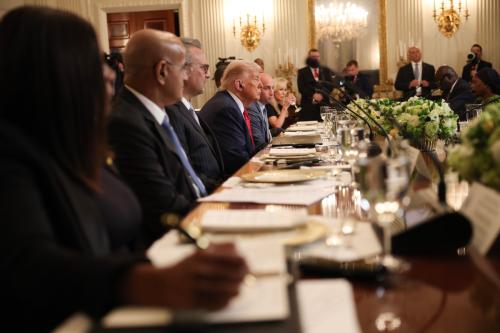Last month, both the U.S. and the European Union (EU) took important internal steps to prepare the ground work for negotiations to establish the Transatlantic Trade and Investment Partnership. TTIP would create the largest integrated market in the world, bringing together half of the world’s GDP and 30 percent of world trade. If it went beyond eliminating already low-level tariffs and succeeded in aligning regulatory standards on both sides of the Atlantic, it also could generate more than 3 percent GDP growth. Beyond bilateral effects, TTIP could also spill over to global-trading trends and serve as a tool for strengthening the Western economic order. But in its current form TTIP would leave Turkey, currently the sixteenth-largest economy in the world, and a long-standing transatlantic ally, out in the cold.
Turkey has been deeply integrated within the EU’s internal market since the establishment of a customs union in 1996. Turkey is in membership negotiations with the EU and has therefore already adopted a number of the EU’s internal regulations.
But under current rules, Turkey must negotiate its own agreement with countries the EU signs preferential trade agreements with. This puts Turkey at a significant disadvantage, as the EU-Turkey Customs Union is structured to allow these countries to access Turkish markets without having to reciprocate by opening their own markets. As long as these agreements were signed with countries that had smaller economies, the cost to Turkey was negligible. But the EU has recently begun negotiating and signing trade agreements with countries that have relatively large economies and high volumes of foreign trade, including Canada, Japan, India, Korea and Mexico. Most of these countries have exports that compete with Turkish ones. Thus, it’s a “lose-lose” situation: Turkey faces greater competition in the EU as well as in its own domestic market without enjoying preferential access to these other markets.
Along with other grievances, this asymmetry helps to explain Turkish prime minister Recep Tayyip Erdogan’s announcement in February that Turkey should consider joining the Sino-Russian Shanghai Cooperation Organization (SCO) in favor of the EU. Even though he subsequently retracted this position, his economy minister, Zafer Caglayan, argued in early April that the EU Customs Union had become “an agreement of servitude” and that Turkey either had to renegotiate new terms or get out of the deal. Caglayan’s remarks may well be a bluff intended only for domestic consumption.
Nevertheless, the exclusion of Turkey from TTIP would only aggravate current grievances about the Customs Union, ranging from ground transportation quotas (which deny Turkey the possibility of exporting greater volumes of goods) to requiring Turkish businesspeople to obtain visas for travel to the EU while the goods they sell travel freely. To many in Turkey, such practices seem to be barriers that deny Turkey its full export potential to the EU market.
A study by the German IFO Institute lists Turkey among countries that are likely to experience a net loss of welfare from TTIP. Such an outcome would aggravate existing grievances and create additional pressures on Turkey to break away from the EU and the broader Western liberal order— an outcome detrimental to the interests of both the EU and the United States.
Turkey was a participant in the formation of the global economic order at the end of the Second World War and has remained a part of it in spite of occasional ups and downs. The EU’s engagement with Turkey, first through a Customs Union and then through the pre-accession process, has bolstered revolutionary political and economic reforms. This contributed to massive economic growth in Turkey, and it became a source of stability in a region that has long suffered from entrenched conflicts. Now a model for economic and political transformation in its neighborhood, Turkey has become a major player in integrating the Balkans, the southern Caucasus and the Middle East into the world economy.
Yet in the last few years, as accession negotiations with the EU stalled, Turkey has looked for other economic opportunities in its immediate neighborhood and beyond. This period has also seen the quality of Turkish democracy decline alongside setbacks in earlier political reforms, particularly freedom of expression. TTIPing Turkey would reengage it with the West.
The instability in the Middle East, as well as growing recognition in Turkey of the economic and security advantages that come with the West, have been gently pushing Turkey back toward Europe. The EU is reciprocating with efforts to revive the accession process. In addition, the recent apology by Israel to Turkey will help deepen cooperation with the United States. And the truce announced by the leader of the separatist PKK is opening the prospects of finding a political solution to the Kurdish problem in Turkey, which in turn should help improve the quality of democracy in the country.
While U.S.-EU negotiations on TTIP are going to be challenging, this should not be an excuse for excluding Turkey from the partnership. The EU must rise to the challenge of recognizing Turkey’s concerns. This year marks the fiftieth anniversary of relations between the EU and Turkey. But the EU has not shown any concern for the interests of its long-standing partner. The TTIP impact report prepared by the European Commission makes no reference to Turkey or how TTIP would impact on the customs union. At least a member of the European Parliament has asked the European Trade Commissioner to consider this question, which may be a step in the right direction.
The United States also should avoid to the temptation to reap the benefits of access to Turkish markets without opening its own market to Turkey. The benefits of involving Turkey in TTIP far outweigh the costs resulting from the additional burdens of the negotiation process. TTIP would create more jobs for Americans and Europeans, not just Turks.
Close economic integration between Turkey and its neighborhood means that a Turkey in TTIP would also benefit countries ranging from Armenia to Ukraine—and even countries like Iraq and Syria, once they achieve some stability. Turkey under TTIP would motivate other countries to join the Western economic order and support the values associated with it. Such an outcome would be win-win for the EU, the United States, Turkey, and a Western economic order under challenge from other parts of the world.
Editor’s note: This article was originally published by The National Journal.
The Brookings Institution is committed to quality, independence, and impact.
We are supported by a diverse array of funders. In line with our values and policies, each Brookings publication represents the sole views of its author(s).



Commentary
Op-edDon’t Forget Free Trade with Turkey
April 15, 2013